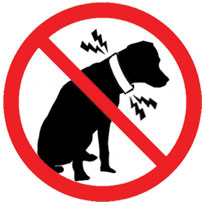Scotland Shock Collar Ban
Wales banned the use of shock collars on dogs and cats back in 2010. Since then a number of influential animal welfare organisations have been calling on Scotland, England and Northern Ireland to also introduce a ban on the sale and use of electric shock collars.

In 2015 at an event calling for a ban on the use and sale of electric shock collars in Scotland, Christine Grahame MSP said:
"With recent Defra research as well as a Scottish opinion poll indicating that electric shock collars are both detrimental to dog welfare and unpopular amongst the general public, I strongly believe that the time is right for the Scottish Government to show their commitment to the welfare of dogs in Scotland and ban these cruel and unnecessary devices."
Then in November 2017 the Scottish government said it would only restrict the use of electronic shock collars - their use would still be possible under supervision.
Fast forward a couple of months and the Environment Secretary Roseanna Cunningham has announced that the Scottish government will go further than that.
Yesterday, 24th January 2018, it was reported that the Scottish Government had decided to implement an immediate ban on aversive training devices. Initial draft guidance has been published, with the ban to be introduced through guidance issued under the Animal Health and Welfare (Scotland) Act 2006 in the coming months.
Draft guidance states that: "Causing unnecessary suffering is an offence under the Animal Health and Welfare (Scotland) Act 2006. This includes suffering caused by inappropriate training methods." Once the guidance has been finalised, the courts will be able to take it into account when establishing liability in a prosecution.
Does "advisory guidance" go far enough?
Dogs Trust have said they would "prefer the ban to be introduced under Section 26 of the Animal Health and Welfare (Scotland) Act 2006 as the current proposal means it's being issued as 'Guidance'. Dogs Trust calls on the Scottish Government to ensure that this will be fully enforceable and will be responding to the consultation on this issue."
Scottish Conservative MSP Maurice Golden says he will "ensure that the Scottish Government sticks to its promise and imposes a total ban on these collars to further protect dogs from cruelty and unnecessary pain."
Shock collars need to be prohibited at a UK level
Scotland's award-winning current affairs magazine, Holyrood, points out that "under current devolution arrangements, controls on the import of electronic devices are reserved to the UK Government. As such, unless importing shock collars is prohibited at a UK level, any restriction on their sale in Scotland could be circumvented through online purchases."
Harry Huyton, director of animal charity OneKind said: "With the use of electric shock collars banned in Wales and now Scotland, our attention must turn to Westminster. Even with these bans, anyone can still buy an electric shock collar in the UK for as little as £20 and break the law by using it to abuse animals. If we are to end their use for good, then Westminster needs to legislate against them too."
Electric training collars are already banned in Wales, Denmark, Norway, Sweden, Austria, Switzerland, Slovenia, Germany and in some states in Australia. The onus is now on England and Northern Ireland to ban the use, sale and import of these devices.

Shock Collars: Do You Really Want To Hurt Me?
Electric shock collars are fitted around a dog's neck and deliver an electric shock via a remote control or automatic trigger. They train dogs out of fear of further punishment by administering shocks to the dog when they do not perform what is asked of them.
In our blog in 2013 we looked at why people use these devices and the effects they can have on dogs.
For more info about shock collars, please see Shock Collars: Do You Really Want To Hurt Me?

Ban them!Appalling devices.
If you have to shock a dog to control it you should not own a dog. Barbaric!